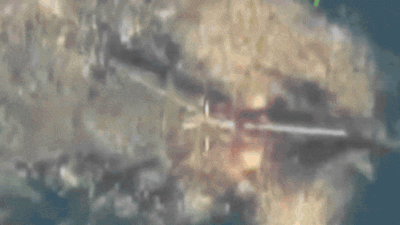
The Israeli military said on Wednesday it had launched massive air strikes across Syria following the overthrow of President Bashar al-Assad. The Israel Defense Forces (IDF) claimed that the 48-hour attack targeted much of Syria’s strategic weapons stockpile to prevent them from falling into the hands of extremist groups.
The Israel Defense Forces said it struck more than 350 locations, including anti-aircraft batteries, missile depots, airports and weapons production facilities in major cities such as Damascus, Homs and Latakia. The military said: “These operations are crucial to eliminate threats to civilian and military ships in the area.” The naval operations destroyed dozens of long-range missiles and 15 Syrian naval ships, causing a major blow to Syria’s military infrastructure.
Israeli officials have denied advancing toward Damascus, insisting that troops were simply entering the long-established buffer zone on Syria’s southern border to ensure the security of Israeli territory. Lieutenant Colonel Nadav Shoshani said: “Reports about Israeli tanks advancing towards Damascus are wrong.” However, opposition sources and local media suggested that Israeli troops had reached within 25 kilometers of the Syrian capital.
Defense Secretary Israel Katz called the attack necessary to establish a demilitarized zone in southern Syria. Speaking in Haifa, Katz warned that any force trying to emulate Assad’s regime would meet a similar fate. He stressed that Israel’s goal is to prevent the resurgence of terrorism in its border areas, especially from groups such as Hezbollah.
The attack and Israel’s incursion into Syria’s buffer zone drew international condemnation. Egypt, Jordan and Saudi Arabia accuse Israel of exploiting instability in Syria to further its territorial ambitions. Türkiye responded to the criticism, calling the actions an act of occupation. The United Nations also weighed in, saying the invasion violated a 1974 disengagement agreement and urging both countries to live up to their international commitments.
Meanwhile, Syria is grappling with the aftermath of Assad’s fall. Opposition forces led by Hayat Tahrir al-Sham (HTS) formed a transitional cabinet led by Mohammed al-Bashir. Damascus has cautiously returned to normal, with businesses reopening and residents expressing hope for a new era of stability. However, the looting of humanitarian aid and uncertainty about the future remain, leaving many Syrians wary of what lies ahead.
Israeli Prime Minister Benjamin Netanyahu confirmed the attack in a video statement, saying the military operation was necessary to destroy Assad’s remaining military capabilities. Netanyahu has also expressed a willingness to build ties with Syria’s transitional government, signaling a possible shift in Israel’s attitude toward its neighbor’s ongoing instability.







